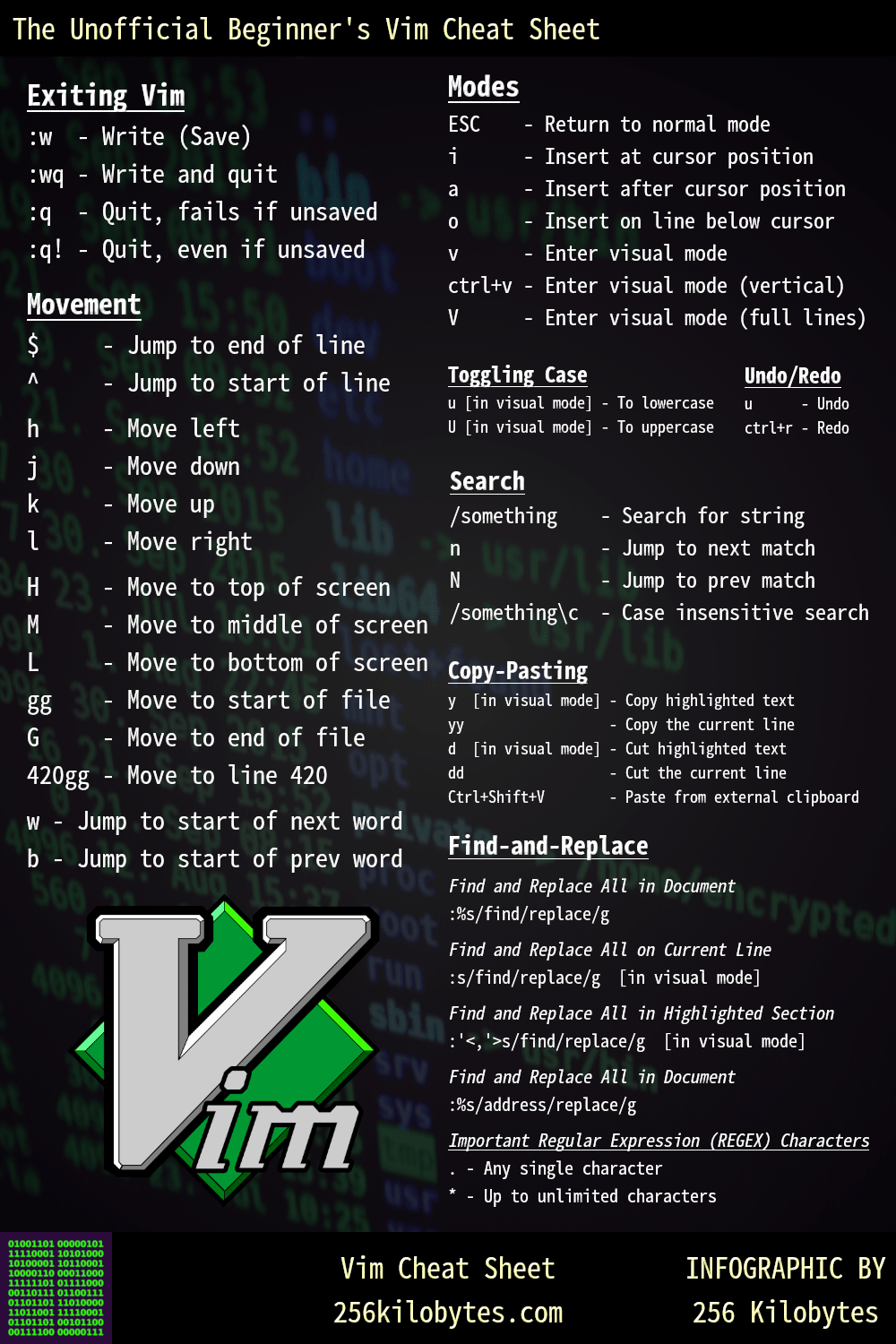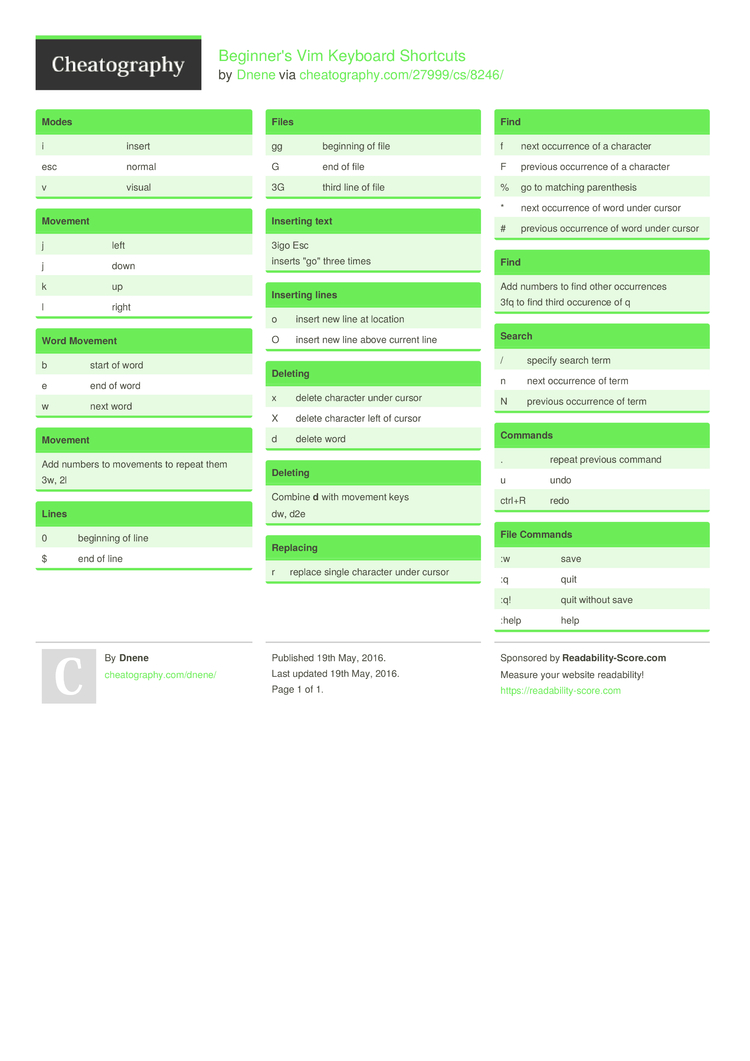
How to download hp printer to macsoftfreethsoft. Press question mark to learn the rest of the keyboard shortcuts. This is my favorite vim cheat sheet. Does anyone know who created it? Posted by 6 years ago. This is my favorite vim cheat sheet. Does anyone know who created it? The cheat-sheet creator! Thanks for hyping my poster. Please do let me. A modern and customizable take on the excellent viemu cheat sheet, supporting vanilla QWERTY as well as alternative keyboard layouts such as Colemak and Dvorak.

Since the 1970s, Vi and Vim are popular amongst developers and are present on most UNIX-based servers. Homeyellowstarter.
These free and open source modal text editors can be a bit hard to use at first, but they are extremely powerful.
Mtp software for macextralasopa. Here is our ultimate Vim Cheat Sheet, featuring over 150 commands to supercharge your coding with Vi/Vim.
A Quick Intro to Vim
Vi is a modal text editor first released in 1976 for Unix systems. Vim, (Vi Improved) Vi’s successor, was first released in 1991. Despite its very old age, Vim is extremely popular among web developers and system administrators, as it is installed by default on all Unix-based systems (Mac OS and Linux distros).Unlike classic text editors, Vim features different modes used for different operations. Vim has a total of 12 modes, although you will mostly use the following:
- Insert Mode: This mode is used to insert text by typing, like you would do on any other text editor. To enter insert mode, type
i while in command mode. - Command Mode: Also named Normal Mode, this mode is used to type Vim commands such as those you’ll find in our Vim Cheat Sheet. To exit insert mode and enter command mode, hit the
Esc key of your keyboard. - Visual Mode: Similar to command mode, but used to highlight areas of text. Normal commands are run on the highlighted area, which, for instance, can be used to move or edit a selection. Press the
v key to start visual mode. To exit visual mode, press the Esc key.
Basics
Let’s start with basic commands that will allow you to write, save and quit files. Remember that these Vim commands need to be typed while in command or visual mode. Exit insert mode by hitting the Esc key, then type the command of your choice.
| :e filename | Open filename for edition |
| :w | Save file |
| :q | Exit Vim |
| :q! | Quit without saving current file |
| :x | Write/Save file (if changes has been made) and exit |
| :sav filename | Save current file as filename |
| . | Repeat the last change made in normal mode |
| 5. | Repeat 5 times the last change made in normal mode |
Moving In The File
Vim features powerful commands that allow you to easily move the cursor position to any desired location within the current file, making it quick and easy to insert text.
| k or Up Arrow | move cursor up one line |
| j or Down Arrow | move cursor down one line |
| e | move cursor to the end of the word |
| b | move the cursor to the beginning of the word |
| 0 | move the cursor to the first non-blank character of the line |
| G | move the cursor to the end of the file |
| gg | move the cursor position to the beginning of the file |
| L | move the cursor to the bottom of the screen |
| :59 | move cursor to line 59. Replace 59 by the desired line number. |
| % | Move cursor to matching parenthesis |
| [[ | Jump to function start |
| [{ | Jump to block start |
Cut, Copy & Paste
Vim features powerful functions to cut, copy, and paste. This section of our Vim Cheat Sheet will show you how to easily perform those operations.Please note that
y stands for
yank in Vim, which in other editors is usually called copy.
| y | Yank/Copy the selected text to clipboard |
| p | Paste clipboard contents |
| dd | Cut current line |
| yw | Yank/Copy word |
| yy | Yank/Copy current line |
| y$ | Yank/Copy to end of line |
| D | Cut to end of line |
Search
Searching a string within a huge file or multiple files can be tricky. Thanks to Vim, using a few commands you can easily find whatever you’re looking for.

| /word | Search word from top to bottom |
| ?word | Search word from bottom to top |
| * | Search the word under cursor |
| /cstring | Search STRING or string, case insensitive |
| /jo[ha]n | Search john or joan |
| /< the | Search the, theatre or then |
| /the> | Search the or breathe |
| /< the> | Search the |
| /< ¦.> | Search all words consisting of 4 letters |
| // | Search fred but not alfred or frederick |
| /fred|joe | Search fred or joe |
| /<dddd> | Search exactly 4 digits |
| /^n{3} | Find 3 empty lines |
| :bufdo /searchstr/ | Search in multiple files |
| bufdo %s/something/somethingelse/g | Search something in all the open buffers and replace it with somethingelse |

Replace
Similar to
Search, Vim features powerful commands to replace any given text. This part of our cheat sheet contains Vim commands for replacing any portion of text with another.
| :%s/old/new/g | Replace all occurences of old with new in file |
| :%s/onward/forward/gi | Replace onward with forward, case insensitive |
| :%s/old/new/gc | Replace all occurences with confirmation |
| :2,35s/old/new/g | Replace all occurences between lines 2 and 35 |
| :5,$s/old/new/g | Replace all occurences from line 5 to EOF |
| :%s/^/hello/g | Replace the beginning of each line by hello |
| :%s/$/Harry/g | Replace the end of each line by Harry |
| :%s/onward/forward/gi | Replace onward with forward, case insensitive |
| x | Delete character |
| :%s/ *$//g | Delete all white spaces and keep any non-blank character |
| :g/string/d | Delete all lines containing string |
| :v/string/d | Delete all lines not containing string |
| :s/Bill/Steve/ | Replace the first occurrence of Bill with Steve in current line |
| :s/Bill/Steve/g | Replace Bill with Steve in current line |
| :%s/Bill/Steve/g | Replace Bill with Steve in all of the file |
| :%s/^M//g | Delete DOS carriage returns (^M) |
| :%s/r/r/g | Transform DOS carriage returns in returns |
| :%s#<[^>]+>##g | Delete HTML tags but keep text |
| :%s/^(.*)n1$/1/ | Delete lines that appear twice |
| Ctrl+a | Increment number under the cursor |
| Ctrl+x | Decrement number under cursor |
| ggVGg? | Change text to Rot13 |
Case
Vim provides very interesting commands to deal with case. Let’s continue to explore our Vim Cheat Sheet with super useful case-related commands.
| Vu | Lowercase line |
| VU | Uppercase line |
| g~~ | Invert case |
| vEU | Switch word to uppercase |
| vE~ | Modify word case |
| ggguG | Set all text to lowercase |
| gggUG | Set all text to uppercase |
| :set ignorecase | Ignore case in searches |
| :set smartcase | Ignore case in searches except if an uppercase letter is used |
| :%s/<./u&/g | Sets the first letter of each word to uppercase |
| :%s/<./l&/g | Sets the first non-blank character of each word to lowercase |
| :%s/.*/u& | Sets the first character of the line to uppercase |
| :%s/.*/l& | Sets the first character of the line to lowercase |

Read and Write Files
Vim allows easy manipulation of files. Listed below are a few examples of file manipulation with Vim.
| :1,10 w outfile | Save lines 1 to 10 in outfile |
| :1,10 w >> outfile | Append lines 1 to 10 to outfile |
| :r infile | Insert the content of infile |
| :23r infile | Insert the content of infile under line 23 |
File Explorer
Vim features a built-in file explorer that allows its users to quickly visualize and open files in the editor.
| :e . | Open integrated file explorer |
| :Sex | Split window and open integrated file explorer |
| :Sex! | Same as :Sex but splits window vertically |
| :browse e | Graphical file explorer |
| :ls | List buffers |
| :cd . | Move to parent directory |
| :args | List files |
| :args *.php | Open file list |
| :grep expression *.php | Return a list of .php files contening expression |
| gf | Open file name under cursor |
Interacting With Unix
As Vi and Vim were initially built for Unix systems, the text editor can interact with the OS.
Vim Keyboard Shortcuts Cheat Sheet Pdf
| :!pwd | Execute the pwd Unix command, then return to Vi |
| !!pwd | Execute the pwd unix command and insert output in file |
| :sh | Temporary return to Unix |
| $exit | Return to Vi |
Alignment
Using Vim, it’s possible to automatically align lines using a few simple commands. Here are the main important ones:
| :%!fmt | Align all lines |
| !}fmt | Align all lines at the current position |
| 5!!fmt | Align the next 5 lines |
Tabs and Windows
Vim Keyboard Cheat Sheet 2019
Vim can use various tabs and windows, which is very useful for working with many files at once.
| :tabnew | Create/Open a new tab |
| gt | Show next tab |
| :tabfirst | Show first tab |
| :tablast | Show last tab |
| :tabm n(position) | Rearrange tabs |
| :tabdo %s/foo/bar/g | Execute a command in all tabs |
| :tab ball | Puts all open files in tabs (Each in a new tab) |
| :new abc.txt | Edit abc.txt in new window |
Window Spliting
Vim Commands Cheat Sheet Pdf
As a web developer, I always like to split my Vim editor in two parts, one for my HTML and one for my CSS stylesheet. This part of our Vim Cheat Sheet describes how to split the main editor window.
| :e filename | Edit filename in current window |
| :split filename | Split the window and open filename |
| ctrl-w up arrow | Put cursor in top window |
| ctrl-w ctrl-w | Put cursor in next window |
| ctrl-w_ | Maximize current window vertically |
| ctrl-w| | Maximize current window horizontally |
| ctrl-w= | Gives the same size to all windows |
| 10 ctrl-w+ | Add 10 lines to current window |
| :vsplit file | Split window vertically |
| :sview file | Same as :split in Read Only Mode |
| :hide | Close current window |
| :nly | Close all windows, except current |
| :b 2 | Open #2 in this window |
Auto Completion
Like much more modern editors, Vim can auto-complete your code and use dictionaries.
| Ctrl+N Ctrl+P (in insert mode) | Complete word |
| Ctrl+x Ctrl+l | Complete line |
| :set dictionary=dict | Define dict as a dictionary |
| Ctrl+x Ctrl+k | Complete with dictionary |
Markers
Vim allows its users to set marks at a position of their choice, so they can easily jump back to that predefined position. A must when working with large files.
| m {a-z} | Marks current position as {a-z} |
| ‘ {a-z} | Move to position {a-z} |
| ” | Move to previous position |
Abbreviations
Another handy Vim function is the possibility to define abbreviations.
Vim Keyboard Cheat Sheet For Beginners
| :ab mail mail@provider.org | Define mail as abbreviation of mail@provider.org |
Text Indent
Indentation is the key to readable and easy-to-maintain code. Vim possesses a few commands that will come in handy for indenting any file.
| :set autoindent | Turn on auto-indent |
| :set smartindent | Turn on intelligent auto-indent |
| :set shiftwidth=4 | Define 4 spaces as indent size |
| ctrl-t, ctrl-d | Indent/un-indent in insert mode |
| >> | Indent |
| << | Un-indent |
| =% | Indent the code between parenthesis |
| 1GVG= | Indent the whole file |
Printable Vim Cheat Sheet Pdf
Syntax Highlighting
Syntax highlighting is often very useful for preventing coding mistakes and typos. Vim can work with many different syntax highlighting modes, depending on which programming language you are coding with.
| :syntax on | Turn on syntax highlighting |
| :syntax off | Turn off syntax highlighting |
| :set syntax=perl | Force syntax highlighting |
Learn Vim from scratch and quickly become more productive.

Design, develop, and deploy end-to-end applications with Vim.










